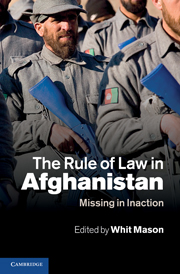Book contents
- Frontmatter
- Contents
- Contributors
- Preface and acknowledgements
- 1 Introduction
- PART I The scope and nature of the problem
- PART II The context
- PART III The political economy of opium
- PART IV Afghan approaches to security and the rule of law
- PART V International interventions
- PART VI Kandahar
- PART VII Conclusion
- Index
Preface and acknowledgements
Published online by Cambridge University Press: 01 June 2011
- Frontmatter
- Contents
- Contributors
- Preface and acknowledgements
- 1 Introduction
- PART I The scope and nature of the problem
- PART II The context
- PART III The political economy of opium
- PART IV Afghan approaches to security and the rule of law
- PART V International interventions
- PART VI Kandahar
- PART VII Conclusion
- Index
Summary
This book has its origins in a brief conversation in the Kabul headquarters of the United Nations Assistance Mission in Afghanistan (UNAMA) two days before Christmas in 2008. I was rushing to Seattle to see my father, David Mason, who was reaching the end of a 14-month struggle with cancer. Not knowing how long I would be gone, I delayed my departure by a day in order to convey the most important things I had learned in the six months after establishing the UN's justice coordination office in Kandahar. I explained the urgency of devising a recruitment strategy to fill the 90 per cent of posts in the formal justice system that remained empty, of ending arbitrary detention, of engaging with the customary justice system, and several other recommendations widely shared by Afghans in the south. The person then presiding over UNAMA's rule of law department smiled and said: ‘Whit, if anything could be done about any of these problems, don't you think that someone would have done it in the past seven years?’ Thanks to my erstwhile colleague for providing such unforgettable inspiration.
In fact, many people have recognised profound mistakes as the intervention has stretched out, and many have suggested better ways of proceeding. The Project on Justice in Peace-building and Development in the Centre of Interdisciplinary Studies of Law (CISL), University of New South Wales, brought several of the brightest of these people together for a symposium, ‘Catalysing the Rule of Law in Afghanistan: Challenges and Opportunities’, on 3 and 4 September 2009 in Sydney.
- Type
- Chapter
- Information
- The Rule of Law in AfghanistanMissing in Inaction, pp. xv - xviPublisher: Cambridge University PressPrint publication year: 2011

